
EAFS 2022 Scientific Committee (ScC)
The Scientific Committee (ScC) is responsible for the scientific program of the EAFS 2022. Committee members have been selected in order to provide necessary prerequisites for a well-balanced Conference program of a high scientific level. The ScC will review abstracts and propose plenary speakers and key note speakers for relevant forensic fields. The members of the ScC are presented below.
Dr. Emil Hjalmarson
Chairman of the EAFS 2022 Scientific Committee, R&D Director
National Forensic Centre – NFC, Swedish Police Authority
Biography
Emil earned his PhD in Electronics Systems from Linköping University in 2006. He has co-founded and held leading positions at AnSyn and AnaCatum Design, providers of software for design of analog semiconductors, and semiconductor data conversion IP respectively. Following the acquisition of AnaCatum Design by Fingerprint Cards, a major provider of biometric sensors to the mobile phone industry, Hjalmarson held leading roles in the companies R&D organization.
Before joining NFC Emil headed the AI and IoT department at RISE (Research Institutes of Sweden) in Linköping. Hjalmarson holds several patents in the fields of integrated data converters, biometric sensor systems, and self-learning electronics.
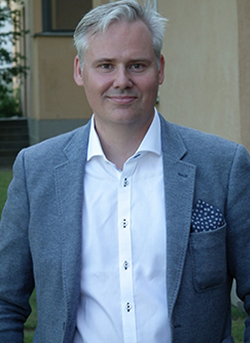
Associate Professor Ricky Ansell
Senior Advisor, Biology Section
National Forensic Centre – NFC, Swedish Police Authority, Linköping University, Sweden
Biography
Since 2007 Ansell holds a position as associate professor at IFM/Biology at Linköping University.
Starting in 2006 Ansell is the Swedish (NFC) representative at the ENFSI DNA Working Group and also the representative at the European DNA Profiling Group (EDNAP), since 2014 appointed expert of the ISO/TC272 committee working on global forensic standards, and since long a member of the International Society of Forensic Genetics (ISFG).

Dr. Peter Bergström
Head of the Information technology section
National Forensic Centre – NFC, Swedish Police Authority
Biography
Since 2014, Peter has been the head of the development team of the IT forensic activities within the Swedish Police Authority. It has involved classification, tracking och prediction of objects and persons in video which increasingly has included artificial intelligence for image processing. The last years even automatic face recognition has been a reliable and useful tool.
The next step is to make score-based likelihood ratio estimations robust to be used in court. Other interesting fields which I have had the fortune to be involved in without being an expert is decryption, extraction of digital information (mobiles, cars, smart homes etc.) and reconstruct information relationship. The charm has always been the diversity with technical challenges, human factors and to contribute to making our society safer.

Dr. Thomas W. Biermann
Leading Scientific Director
Bundeskriminalamt – BKA, Deutschland
Biography
Thomas graduated from the University of Frankfurt with a M.Sc. in Biology in 1983. In 1988 he gained his PhD after completing research dealing with the impact of UV-B radiation on lipid metabolism and on fatty acid patterns in synchronously growing marine diatoms. Thomas then joined the Forensic Science Institute in the Bundeskriminalamt and specialized in the examination of fibres and textiles.
From 1999 to 2006 Thomas was the head of the Fibres Section. He lectured in Europe and the United States of America and he has been the author and co-author of many publications concerning fibre and colour frequencies.
In 1997, 2001 together with Mike Grieve and 2007 he gained the PW Allen Award of the Forensic Science Society for the most meritious paper published in Science & Justice.
Thomas was a member of the steering committee of the European Fibres Group and member of the Scientific Working Group for Materials (SWGMAT) Fibres Section in the U.S.A.
After almost 20 years of reporting in court and research dealing with the evidential value of fibres and colours since November 2006 he has been the head of the Drugs Section of the Forensic Science Institute at the Bundeskriminalamt.
In 2013 Thomas became the head of Biometrics Department including the analysis of human DNA, latent Fingerprints analysis and Face Comparison, Handwriting, and Text, Audio and Speech.

Dr. Amalia Brouver-Stamouli
Senior Scientist/Team Leader, Gunshot residue
Netherlands Forensic Institute – NFI, the Netherlands
Biography
It was in 2004 when Amalía started her forensic career at the Nederlands Forensic Institute (NFI) that she in contact came with a new science, that of forensics. Currently she is a gunshot residue expert and the head the GSR team. The investigations include analysis of traces with scanning electron microscopy, 2D micro-X-Ray Fluorescence and chemometric methods in combination with visual analysis in order to reconstruct shooting incidents.
Amalía is a member of the Steering Committee of the ENFSI Expert Working Group Firearms/GSR. She is, as a co-author involved in various projects of the working group. She has also lead twee Monopoly projects in the field of firearms and GSR databases and best practice manuals.
As a physicist she is exploring new technologies (statistics, big data, instrumentational and visualization) and obtaining background data that will help experts in the reconstruction of shooting incidents. The direct link to case work is the main goal of the various projects.
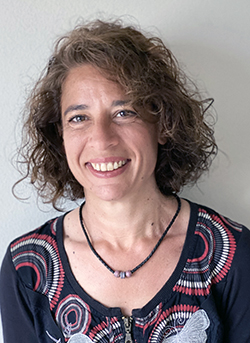
Dr. John Butler
NIST Fellow & Special Assistant to the Director for Forensic Science
U.S. Government-Department of Commerce, National Institute of Standards and Technology-NIST, US
Biography
Dr. Butler’s research, first conducted at the FBI Laboratory and now at the National Institute of Standards and Technology (NIST), pioneered the methods used today worldwide for DNA testing in criminal casework, paternity investigations, and many DNA ancestry procedures. Dr. Butler is a NIST Fellow (highest scientific rank at NIST) and Special Assistant to the Director for Forensic Science. He served as the Vice-Chair of the National Commission on Forensic Science from 2014 to 2017. In 2019, he was elected the President of the International Society for Forensic Genetics (ISFG).
Dr. Butler and his wife have six children, all of whom have been proven to be theirs through the power of DNA testing.
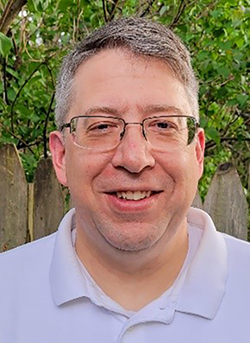
Professor Eoghan Casey
Chief Scientist of the Defense Cyber Crime Center (DC3)
University of Lausanne- UNIL, Switzerland
Biography
He has consulted on a wide range of digital investigations, including fraud, violent crimes, identity theft, and on-line criminal activity. He has helped organizations investigate and manage security breaches, including network intrusions with international scope. He has delivered expert testimony in complex civil and criminal cases. He wrote the foundational book Digital Evidence and Computer Crime, now in its third edition, and he has coauthored several advanced technical books. Since 2004, he has been Editor-in-Chief of FSI Digital Investigation, publishing cutting edge work by and for practitioners and researchers.
He was nominated as CASE Presiding Director to lead development of an international standard for sharing cyber-investigation traces. He serves on the Digital Forensic Research Workshop (DFRWS) Board of Directors and helps organize biannual digital forensic research conferences. He also contributes to forensic science definitions, guidelines, and standards on the Digital/Multimedia Scientific Area Committee (DMSAC) of the NIST Organization for Scientific Area Committees (OSAC).
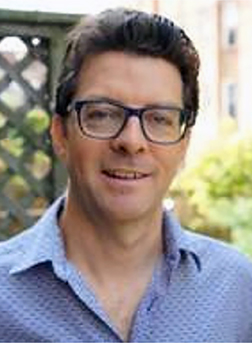
Professor Christophe Champod
Professor at School of Criminal Justice
University of Lausanne- UNIL, Switzerland
Biography
He is in charge of education and research on identification methods (interpretation of DNA, facial images, fingerprints, toolmarks, footwear marks and firearms) and has the privilege to work with a group of 20 PhD students. The research carried out by his group is mainly devoted to the inferential aspects associated with forensic identification techniques. The value to be attached to forensic evidence is at the core of their interests.
He is also operational manager of the ISO/SEC 17025 accredited forensic laboratory of the ESC. He maintains an activity as an expert witness in areas of marks and biological evidence interpretation both at a national and international level.
He is a steering committee member for the International Fingerprint Research Group (IFRG) and an invited member of Friction Ridge subcommittee of the Organization for Scientific Area Committees (OSAC).

Associate Professor Simon Dunne
Forensic Specialist, Drugs Analysis Section
*National Forensic Centre – NFC, Swedish Police Authority
Biography
Upon shifting to the Swedish National Forensic Centre (Linköping) in 2012 I have taken the role as specialist and research coordinator within the Drug analysis unit at the Swedish National Forensic Centre. My research expertise has found particular application in the areas of the structural elucidation of unknown chemical substances (new psychoactive substances (NPS), medical preparations, doping substances for example), new methods for chemical profiling, hyperspectral imaging, chemometrics, field analysis instrument development and method development/validation of all forms of spectroscopic and chromatographic techniques used within the unit.
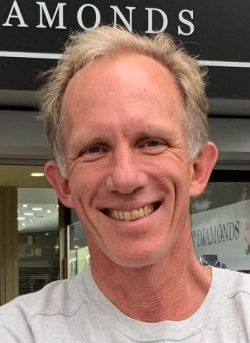
Philip Engström
R&D Coordinator at Information Technology Section
National Forensic Centre – NFC, Swedish Police Authority
Biography
Philip has a M.Sc. in Media Technology from Linköping University and Stanford University from 2006, and has over 15 years experience of technical and management roles within the information technology field from a broad spectrum of companies and agencies. His specialties include image processing, AI, visualization and VR, and his work has contributed to Stanford’s autonomous driving team successful efforts in the DARPA Grand Challenge as well as defense research projects together with NASA JPL.
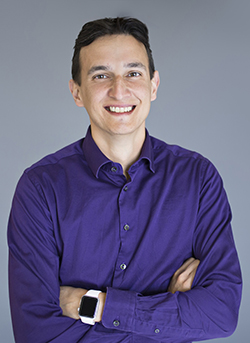
Professor Zeno Geradts
Senior Forensic Scientist
Forensic Digital Biometrics Traces department, Netherlands Forensic Institute – NFI
Professor on Forensic Data Science, University of Amsterdam, the Netherlands
Biography
He works within the European Project ASGARD on Forensic big data analysis. He was President of the American Academy of Forensic Science 2019-2020 and chairman of the ENFSI Forensic IT Working group.
From September 1st 2014, he is full professor on Forensic Data Science by special appointment at the University of Amsterdam for 1 day a week. He is active in forensic science since 1991 and has received several awards including the Distinguished Forensic Scientist award from ENFSI in 2012.
Specialties: Forensic Science, program manager big data and cyber forensics, forensic ict, digital evidence and multimedia, face comparison, biometrics, video analysis, R&D coordination.

Mike Groen
Senior Forensic Scientist, Netherlands Forensic Institute – NFI
Forensic Archaeologist, Leiden University, the Netherlands
Biography
He is the deputy chair of the ENFSI EWG Scene of Crime and chairs of the Forensic Archaeology subgroup within the Scene of Crime working group.
His past professional experience relates to GIS, 3D-imaging, archaeology and physical anthropology. As archaeologist, he was involved in archaeological excavations in the Netherlands between 1994 and 2005. As physical anthropologist, he was attached to the Leiden Medical University Centre (LUMC) between 2002 and 2012, and was involved in both the recovery and analysis of human remains from medieval and postmedieval contexts. His current research interest include forensic archaeology, human taphonomy, remote sening, GIS, predictive modeling and crime scene science.
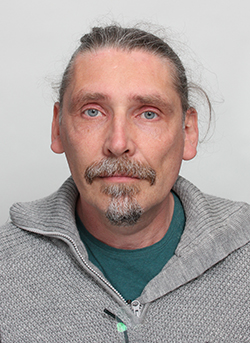
Associate Professor Johannes Hedman
Specialist, National Forensic Centre – NFC, Swedish Police Authority
Adjunct Senior Lecturer, Lund University, Sweden
Biography
Johannes Hedman is Specialist at the Swedish National Forensic Centre (NFC) and Adjunct Senior Lecturer at Lund University. He has been in the field of forensic DNA analysis since 2002. His holds a PhD in Engineering that involved research on PCR-inhibitors in forensic DNA samples.
His current research focuses on controlling and improving modern analytical techniques such as massively parallel sequencing. This includes increasing the understanding of analytical bottlenecks, for example finding PCR inhibition mechanisms of relevant substances. Bayesian statistics, decision theory and mathematical modelling of analytical processes are cornerstones in his research.
Johannes has led the development of several sampling and sample treatment methods that are now used by the Swedish Police Authority, targeting for example soil samples, adhesive tapes, cartridge cases and cotton swabs. At Lund University, Johannes leads a research group on forensic DNA/RNA analysis, which is closely linked to NFC. He has been main supervisor for one PhD student and assistant supervisor for two other students.
He has also supervised over 20 MSc and candidate students. His h-index is 16 (Google Scholar). He has published 25 original research articles and 8 review articles, book chapters and books. He is reviewer for 17 scientific journals in the fields of biochemistry, biotechnology, environmental science and forensics.
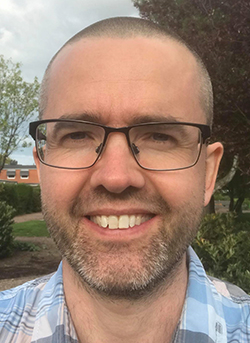
Associate Professor Martin Josefsson
Operational Developer
National Forensic Centre – NFC, Swedish Police Authority, Linköping University, Sweden
Biography
Nearly twenty year in the position as a research chemist at Dept. of Forensic Genetics and Forensic Toxicology, National Board of Forensic Medicine (RMV) Linköping. Responsible for implementation of LC-MS and high resolution mass spectrometry techniques. In head positions for research and development as well as the planning and building of new laboratory facilities.
Since more than twenty years’ university lecturer and associate professor affiliated at Dept. of Physics, Chemistry and Biology, Linköping University since 2012.
Have more than 40 publications mostly on analysis of therapeutic or illicit drugs and their metabolites in clinical and forensic settings. Specialized on liquid chromatography, enantioselective analysis, high resolution mass spectrometry and NPS-drug metabolism.
Since 2017 operational developer at the Drug unit of National Forensic Center (NFC) in Linköping and having a head position at NFC for long term planning and development of new laboratory facilities.’
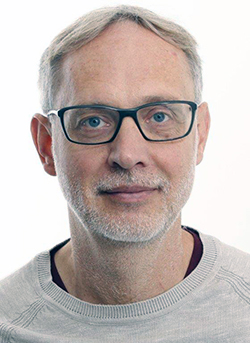
Adjunct Professor Lena Klasén
Research Director, Office of the Police Commissioner, Swedish Police Authority
Adjunct Professor, Linköping University, Sweden
Biography
January 2015 to November 2018 she was Director of the Swedish National Forensic Center – NFC (formerly Swedish National Laboratory of Forensic Science – SKL). She has a PhD in Image Coding at University of Linköping, Sweden and has led industrial- and research organizations in Swedish authorities such as Saab AB, Swedish Defence Research Agency – FOI, Swedish Defence Material Administration – FMV, Swedish National Laboratory of Forensic Science – SKL and the Implementing Committee of the New Police organization – SoU at the Swedish Ministry of Justice.
Lena has held several commissions of trust, e g as board member and expert including being appointed as forensic expert by the US Department of Justice. Her industrial experience includes product portfolio management at Saab and being involved in starting up innovative companies.

Dr. Erik Krupicka
Forensic Expert
Bundeskriminalamt – BKA, Deutschland
Biography
2001-2002: Post-Doctoral Research in Solid State Chemistry at University of Augsburg, Germany
2002 – 2013: Forensic X-Ray Analysis (XRD, XRF) at BKA Forensic Science Institute in Wiesbaden, Germany
2013 – 2020: Cryptanalysis and Password Recovery at BKA Forensic Science Institute in Wiesbaden, Germany
Since 2020: Image, Audio and Video Forensics at BKA Forensic Science Institute in Wiesbaden, Germany
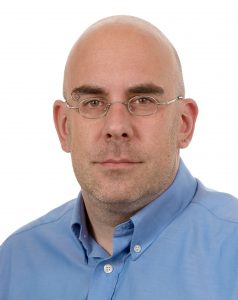
Professor Bela Kubat
Forensic pathologist and forensic neuropathologist, Maastricht University, Netherlands Forensic Institute – NFI
Professor, Maastricht University, The Netherlands
Biography
I studied medicine at the Catholic University in Nijmegen, The Netherlands. After finishing the university I trained in neurology for 2 years and internal medicine for 1 year at the Rijksuniversiteit Limburg, Maastricht, The Netherlands. Thereafter I received training in neuropathology at the University Essen, Germany and in Clinical Pathology at the Rijksuniversiteit Limburg, Maastricht, The Netherlands.
After a short employment as pathologist and neuropathologist at the Rijksuniversiteit Limburg I started my career as forensic pathologist and forensic neuropathologist at the Nederlands Forensisch Instituut in The Hague in 2003.
In 2015 I was appointed Professor of Forensic Pathology at the Faculty of Health, Medicine and Life Science of the Maastricht University.
My special fields of interest are forensic neuropathology, cardiopathology, clinical post-mortem pathology, post-mortem radiology and transportation accident investigation.
Currently I work both for the Maastricht University and the Nederlands Forensisch Instituut in The Hague. My tasks at the university are education of medical and life science students as well as residents in the medico-legal field. Furthermore I organize in co-operation with my clinical pathology colleagues post-doctoral international courses in forensic neuropathology and national clinical post-mortem trainings. Recently I had performed clinical post-mortems during the corona pandemic and am involved in the evaluation of the viral effect in these cases.
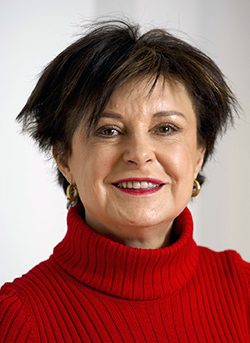
Dr. Maria Ledin
Forensic Expert, Chemistry and Technical Section
National Forensic Centre – NFC, Swedish Police Authority
Biography
Maria has been involved in the quality assurance of footwear mark comparisons within the Swedish Police and in the subsequent training of footwear mark examiners.
As of today, Maria Ledin specialises in tool marks. Her core duties involve forensic casework, development of reporting and examination methods for tool marks, and research and development of vacuum seal comparisons.
Over the years, she has developed a particular interest in how to apply research results in casework as well as approaches for increasing the knowledge of tool marks by collecting and analysing information from casework and tool manufacturing. Maria Ledin received her Ph.D. in 1994 from the Linköping University, Sweden on the adsorption of metals to microorganisms in soil systems and continued her research by studying microbiology in mine waste.

Dr. Elisabet Leitet
Senior Forensic Expert Information Technology Section
National Forensic Centre – NFC, Swedish Police Authority
Biography
Elisabet is leading the implementation of facial recognition 1:N searches against the Swedish mugshot database. She is also a forensic expert in manual facial image comparison, and leads the work at NFC to develop a score-to-LR method where a facial recognition algorithm is used for evaluation purposes for facial comparisons.
Elisabet represents the NFC in international experts groups such as the Interpol expert facial working group (IEFWG) and the American based Facial Identification Scientific Working group (FISWG), and is a team member of the EU-projects TELEFI and PERSONA. During 2017/2018, Elisabet was working for the United Nations Office of Disarmament Affairs as investigator specializing in forensics.

Jonas Malmborg
Forensic Expert, Chemistry and Technical Section
National Forensic Centre – NFC, Swedish Police Authority
Biography
Jonas Malmborg is a forensic expert practioneer and R&D coordinator at the Swedish National Forensics Centre (NFC). His primary case work focus is related to the forensic analysis of oils and fat.
He is a member of the European Oil Spill Identification Network (Bonn-OSINet) and is currently involved in the development of an international standard for oil spill identification.
Prior to his 12 years in forensics, he has a background from chemical industry and has published research in the fields of pharmaceutical and biogas development. His forensic research papers relates to the source identification of spilled diesel fuels. Validation of values attached to forensic evidence and pushing R&D forward in the fields of chemical analysis and marks remains a core interest.
Jonas Malmborg received his M.Sc. in chemistry from Linköping University in 1995.

Professeur Honoraire Pierre Margot
School of Criminal Justice
University of Lausanne- UNIL, Switzerland
Biography
Holder of the chair in forensic science since 1986 as the 4th professor occupying the first academic chair in forensic science, created in 1909, he led a research centre and developed further the discipline as a key actor of forensic intelligence, investigative science and in providing evaluative reports. Internationally acclaimed he received major awards (Douglas M. Lucas Medal, American Academy of Forensic Sciences, doctorate honoris causa, University of Québec (Canada), French speaking Pantheon of criminalistics, ENFSI contributor award and the John Dondero Award of the IAI. Pierre Margot was associate editor of Forensic Science International until 2021, and author of numerous publications
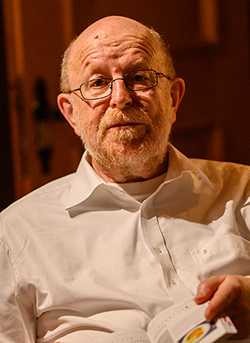
Dr. Erwin J.A.T. Mattijssen
Forensic Scientist/ R&D Coordinator, Firearms and Toolmarks Section
Netherlands Forensic Institute – NFI, The Netherlands
Biography
In 2010 he started working as a forensic firearm examiner at the Netherlands Forensic Institute. In addition to his work as an examiner, he is the R&D coordinator of the Firearm and Toolmarks section and is a member of the NFI’s R&D guidance committee. Since 2013, he also works as coordinator and lecturer for the course ‘Observer Based Techniques’ within the MSc program ‘Forensic Science’ at the University of Amsterdam.

Dr. Martina McBride
Director of Science and Development
Forensic Science Ireland – FSI, Ireland
Biography
In the past I have been a member and the Chairperson of the Body Fluid Forum (BFF) which is a UK and Irish research and development group sponsored by the AFSP.
I am now Director of Science and Development in Forensic Science Ireland. One of my roles in FSI is to develop a strong R and D culture and foster innovation. I am also responsible for the Quality system and accreditation.
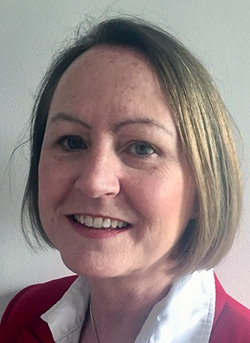
Professor Didier Meuwly
Principal Scientist, Netherlands Forensic Institute – NFI
Chair of Forensic Biometrics, University of Twente, the Netherlands
Biography
He currently shares his time between the Forensic Institute of the Dutch Ministry of Security and Justice (Netherlands Forensic Institute – NFI), where he is a principal scientist, and the University of Twente (UT), where he holds the chair of Forensic Biometrics from 2013 onwards. He specializes in the automation and validation of the probabilistic evaluation of forensic evidence, and more specifically biometric traces. From 2002 to 2004 he worked as a senior forensic scientist at the R & D department of the UK Forensic Science Service (FSS), then an executive agency of the UK Ministry of the Interior.
Didier has served as a criminalist in several international terrorist cases on request of the ICTY, STL, UN and UK, has authored and coauthored more than 60 scientific publications and book chapters in the field of forensic science.
Didier is an associate and guest editor of Forensic Science International (FSI), a member of the R & D standing committee for research and development of the European Network of Forensic Science Institutes (ENFSI) and a member of the ISO Technical Committee 272 editing the first ISO forensic science standard (21043).
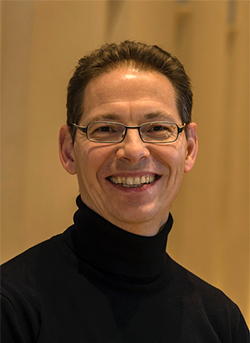
Dr. Nada Milisavljevic
Team leader/ Scientific Coordinator, in the area of Fight against Crime and Terrorism (FCT), in the unit “Innovation and Security Research”
Directorate-General Migration and Home Affairs (DG HOME), European Commission
Biography
Nada Milisavljević is the team leader and the scientific coordinator for the area of Fight against Crime and Terrorism (FCT) in the unit “Innovation and Security Research” of the Directorate-General Migration and Home Affairs (DG HOME). The research area of FCT encompasses various branches of forensics, with the applications to fighting cybercrime and organised crime, police cooperation, and counter-terrorism.
Before joining the European Commission, Nada was a researcher at the “Signal and Image processing Centre” (SIC) of the Royal Military Academy of Belgium, and she is (co)author of around 100 scientific publications, mainly in the areas of image processing and data fusion. Nada holds a Bachelor and a Master degree in electrical engineering, and a PhD degree in applied sciences.
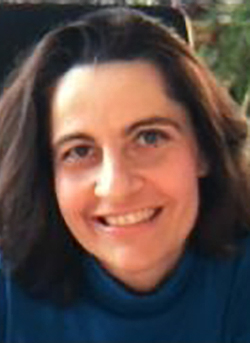
Dr. Tereza Neocleous
Senior Lecturer in Statistics
University of Glasgow, UK
Biography
Tereza is an applied statistician with research interests in the areas of quantile regression, multilevel models and multivariate data analysis. She has worked on statistical models for health, epidemiology and forensic science applications with special focus on chemometrics and phonetics.
For the past decade Tereza has been involved in training forensic scientists in the use of statistics as an instructor at the FORSTAT workshops. Tereza is a fellow of the Higher Education Academy and of the Royal Statistical Society, where she has previously served as a committee member of the Statistics and Law Section. She is currently a committee member of the Special Interest Group on Women in Data Science and Statistics. Tereza was one of the recipients of the 2018 Maths and Computing Suffrage Science awards.
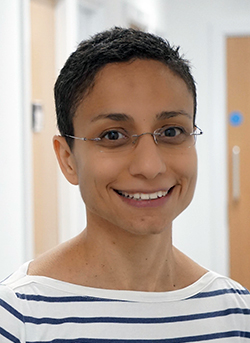
Professor Niamh Nic Daeid
Professor of Forensic Science, University of Dundee, UK
Director of the Leverhulme Research Centre for Forensic Science (LRCFS)
Biography
Professor Niamh Nic Daeid is an award winning Chartered Chemist and Authorised forensic scientist. She is a Professor of Forensic Science and Director of the Leverhulme Research Centre for Forensic Science at the University of Dundee. She has been involved in forensic science education, research and casework for over 25 years.
She is a Fellow of the Royal Society of Edinburgh and holds fellowships of the Royal Society of Chemistry, the Chartered Society of Forensic Science, the Institute of Chemistry of Ireland, the Royal Statistical Society and the UK Association of Fire Investigators.
Niamh has previously chaired the ENFSI working group for fire and explosion investigation and the INTERPOL forensic science managers symposium. She was vice chair of the scientific advisory board of the International Criminal Court for 6 years and acts as an advisor to the United Nations Office of Drugs and Crime (UNODC). She is an appointed Commissioner on the Dundee Drugs Commission investigating drug related deaths in Dundee.
Niamh has received a range awards including the ENFSI distinguished scientist award, the Pete Ganci award for services to fire investigation and the Stephen Fry Award for public engagement. Her Centre was awarded a UK National Gold Watermark for public engagement in 2019. She has published over 200 peer reviewed research papers and book chapters and holds a research grant portfolio in excess of £28 million.
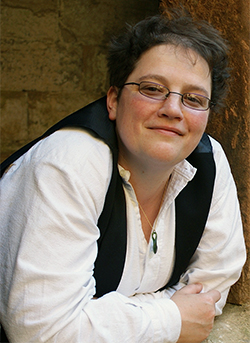
Associate Professor Anders Nordgaard
Statistician
National Forensic Centre – NFC, Swedish Police Authority, Linköping University, Sweden
Biography
I have a 35 years’ background as teacher and researcher in statistics at Linköping University, Sweden, where I part-time still give courses and supervise thesis work. I have co-operaded with researchers at The Swedish Defence Research Agency and at Chalmers University in Gothenburg, Sweden in forensic statitics projects funded by several Swedish research councils.
I have also co-operated with researchers from many forensic laboratories/institutes and universities around Europe in projects on evidence evaluation and chemometrics funded by European Union through ENFSI.
I have since 2007 been an agreement holder (consultant) in several coordinated research projects on food safety funded and organised by the Joint FAO/IAEA Division of Nuclear Techniques in Food and Agriculture, with project participants from development countries in the entire world. I am Editor-in-chief of Law, Probability & Risk (Oxford University Press) since 2016.
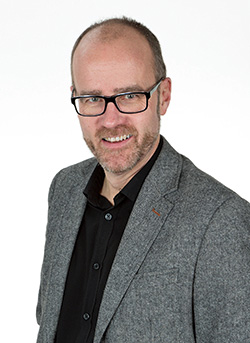
Dr. Bart Nys
Research Coordinator
National Institute of Criminalistics and Criminology (NICC), Belgium
Biography
He has been closely involved in the activities of the ENFSI Firearms/GSR Working Group since 1995 and he remains to this day active in the scientific developments within this group. Since 2013 he is a member of the Research and Development Standing Committee of ENFSI, acting as its chairman from 2015 to 2018.
Since ENFSI has recently taken an interest in providing training and education for forensic experts in the CBRN area, his current interests also include establishing common training and awareness programmes for forensic and CBRN experts. In this context he is active in a number of national and international projects and has worked as a lecturer for CEPOL in context of the course 80/2018: Forensic investigation in CBRN contaminated environment/terrorist attack.
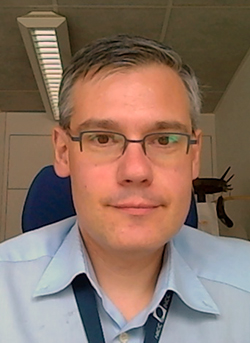
Dr. Tapani Reinikainen
Director of R&D
National Bureau of Investigation – NBI, Finnish Police, Finland
Biography
He is highly experienced project manager and has been leading research and development programs (Forensics, Biotechnology, IT) in Finnish Police, Industry (Danisco, Cultor) and academia (VTT, Biotechnology). His main interests are development and application of novel forensic tools, evaluative reporting and improvement of working processes.
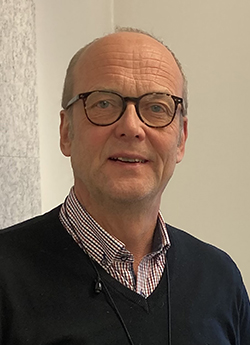
Distinguished Professor Claude Roux
Professor of Forensic Science, University of Technology Sydney (UTS), Australia
Director of the Centre for Forensic Science, Australia
Biography
Claude has a long history of establishing strong partnership with a variety of government and industry organisations. He has published more than 190 refereed papers and 26 book chapters.
His research has been funded by the Australian Research Council, the Australian Defence Science and Technology Group, the US Combating Terrorism Technical Support Office and the US National Institute of Justice.
Claude is a member of a number of expert and advisory groups in Australia and overseas. He is the current President of the International Association of Forensic Sciences (IAFS), immediate Past-President of the Australian & NZ Forensic Science Society and a Fellow of the Royal Society of New South Wales. He also serves on the Scientific Advisory Board of the International Criminal Court. He earned his undergraduate and PhD degrees in forensic science and criminology from the University of Lausanne, Switzerland.
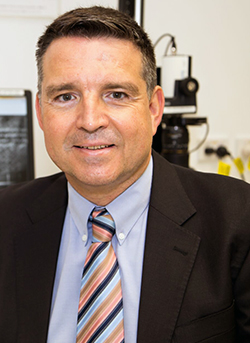
Dr. Justice Tettey
Chief, Laboratory and Scientific Section
United Nations Office on Drugs and Crime (UNODC)
Biography
Dr. Tettey joined the United Nations Office on Drugs and Crime in 2008 as Chief of the Laboratory and Scientific Section, Division of Policy Analysis. He is responsible for the implementation of the Office’s Global Scientific and Forensic Services Programme, the Global Synthetic Drugs Monitoring Analysis Reporting and Trends (SMART) Programme and the Integrated Strategy on the Global Opioid Crisis.
Dr. Tettey has over 28 years of experience in various aspects of medicines regulation and international drug control and has published extensively on a wide range of topics including, pharmaceutical analysis, drug metabolism and toxicity, illicit synthetic drug markets, international drug policy and forensic science. He was awarded the Fellowship of the Royal Society of Chemistry of the United Kingdom in 2008 and an honorary degree of the Doctor of Laws by the University of Dundee, United Kingdom in 2019.
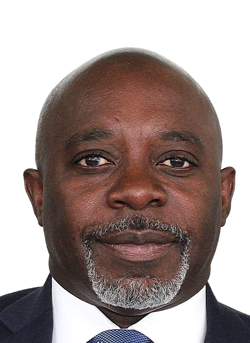
Professor Arian van Asten
Program Director of the Master Forensic Science (MFS),
Co-Director of the Co van Ledden Hulsebosch Center (CLHC)
University of Amsterdam, The Netherlands
Arian van Asten was appointed in 2018 as full professor in Forensic Analytical Chemistry and On-scene Chemical Analysis at the University of Amsterdam (UvA). He is also the co-director of the Co van Ledden Hulsebosch Center (CLHC), the Amsterdam Center for Forensic Science and Medicine, and the director of the Master’s program in Forensic Science of the UvA, a unique 2-year MSc curriculum on forensic science in the Netherlands. Prior to his appointment he worked for 12 years at the Netherlands Forensic Institute (NFI) as department head, professor by special appointment and as coordinator of R&D programs and complex/international cases. Before entering the forensic domain, he worked for 10 years in industry (AkzoNobel and Unilever). Van Asten holds a PhD in Analytical Chemistry (specialization chromatography and polymer analysis) and received the Kolthoff award of the Royal Dutch Chemical Society (KNCV) for his PhD thesis in 1996. He is member of the editorial board of Forensic Chemistry and of the scientific advisory board of the Netherlands Institute for Conservation, Art and Science (NICAS) and the National Forensic Center (NFC) of Sweden. His current research interests include rapid, mobile and on-scene chemical analysis in forensic science and other fields, chemical profiling and forensic intelligence of explosives, chemical agents, drugs of abuse and ignitable liquids, robust identification of NPS isomers, forensic toxicological analysis of alternative matrices, chemical imaging in forensic science and forensic applications of comprehensive gas and liquid chromatography. He has (co)authored 49 peer reviewed scientific papers on analytical chemistry, polymer characterization and forensic science (h-index 21 – Google Scholar, June 2020 including self-citation). Van Asten has been involved in several successful forensic science applications in Dutch and European funding programs and currently supervises several PhD projects in forensic chemistry. Biography
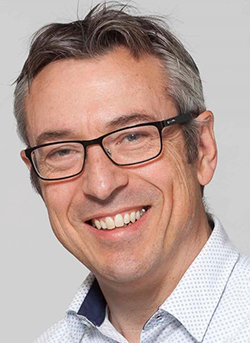
Honorary Professor Sheila Willis
Leverhulme Research Centre for Forensic Science (LRCFS)
University of Dundee, UK
Biography
She spent most of her career in Forensic Science Ireland where she was Director General 2002-2017.
From 2017-2019 she was a Guest Researcher at the National Institute of Standards and Technology in the US, where she was part of a team reviewing the scientific foundations of DNA mixture interpretation.
She has been active in professional affaires including ENFSI throughout her career and is now President elect of the Chartered Society of Forensic Sciences.
She was on the scientific committee of the European Academy meetings in 2006, 2009 and 2012. She served on the editorial board of Science and Justice 2007-2014 and Forensic Science – Policy and Management 2007-2014, editorial board of the Special Edition of Forensic Science International 2012, 2015 and 2018. She was guest editor of that edition in 2006.
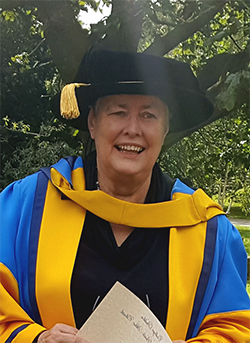
Contact
General questions
Contact the conference bureau, Meetagain eafs2022@meetagain.se | +46 8 664 58 00





